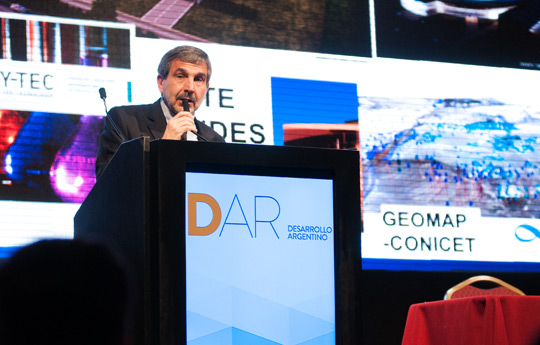INSTITUTIONAL NEWS
Dr. Salvarezza participated in the Science, Technology and Innovation Conference organized by DAR Foundation
The president of the CONICET spoke about the achievements of the organization and the need to transfer new knowledge
The president of the National Scientific and Technical Research Council (CONICET), Dr. Roberto Salvarezza, participated in the Science, Technology and Innovation Conference “From Growth to Development”, together with the governor of the Province of Buenos Aires, Daniel Scioli; and the minister of Science, Technology and Productive Innovation, Dr. Lino Barañao.
The conference, which was organized by the Argentine Development Foundation (DAR), was aimed at acknowledging the achievements of the national scientific system in the last twelve years and choosing the future path to deepen the achievements to obtain a technological and social development model. The objective is to build on what has already been built to go on making progress.
During the talk about “Science, Research and Development”, Dr. Salverezza showed some figures to illustrate with examples how much has been done in terms of science and technology in the last years in order to show the political measures taken for that. He spoke about the current staff of researchers, fellows and technicians the CONICET has and emphasized that the human resources are the most important values for a country. We need resources to develop science.”
Besides, he mentioned the budget development of the scientific and technological system, which is “the result of a measure of the National Government that has believed that science and technology are important supplies for the development of the country.”
For the president of the Council, “Our country has a science and technology system strengthened by human resources, infrastructure and equipment. This is the result of twelve years of government in which knowledge was considered as vital for development and quality of life of citizens. Scientists and technologists in our country showed that it is possible to develop leading-edge technology, ranging from satellites to plant biotechnology.” For this reason, the main challenge is “to find a way to transfer that knowledge to the society and the State and use it for the progress of the country”, he concluded.
Dr. Claudio Fernández, director of the Max Planck Laboratory of Rosario, the Instituto de Investigación para el Descubrimiento de Fármacos of Rosario (IIDEFAR, CONICET-UNR) and Plataforma País Ciencia, also participated in the speech. He emphasized the need to “advance from growth to development, that is to say, from a model of hierarchy and value of Argentine science and technology towards an economic and social reassessment model.”
For his part, Daniel Scioli defined the scientific system as a “strategic sector of the agenda of national development” and added that “there is collective awareness as regards science and technology as an investment for all.” He considers that development is linked to the scientific system because it provides competitiveness for the country and innovation for the productive system.
Buenos Aires province governor committed to “increasing the investment in science and technology, which is currently 0.6%, and the plan is to increase it to 1%.
Dr. Barañao said “we want to reach a model of country where knowledge generates value because this guarantees a good education system and a more democratic society. Tecnópolis is the three-dimensional photo that indicates where we want to go.”
The opening was in charge of José Scioli, president of DAR Foundation; and Eng. Carlos Gianella, undersecretary of Science and Technology of the province of Buenos Aires. The Conference was also attended by Dr. Alberto Kornbliht, senior researcher at the Council and director of the Institute of Physiology, Molecular Biology and Neuroscience (IFIBYNE, CONICET-UBA); Héctor Otheguy, general manager of the INVAP; Dr. Conrado Varotto, president of the National Commission on Space Activities (CONAE); and Dr. Alberto Lamagna, manager of Research and Development of the National Atomic Energy Commission (CNEA).
